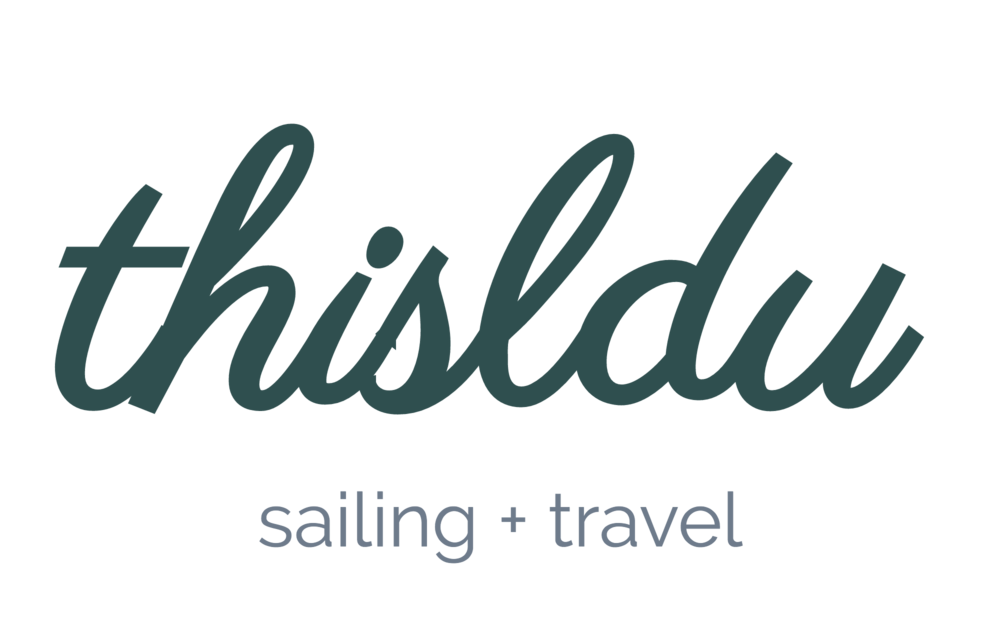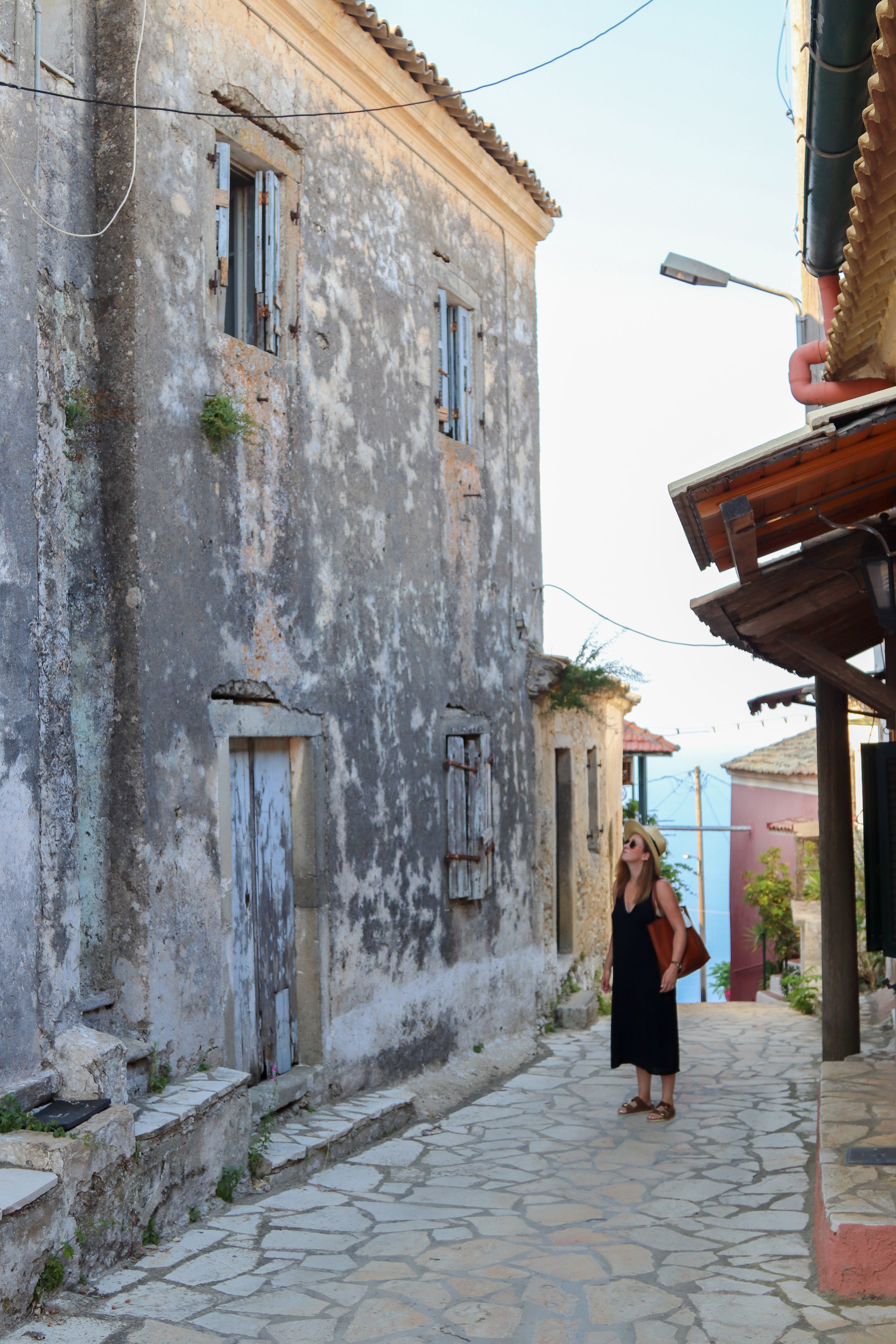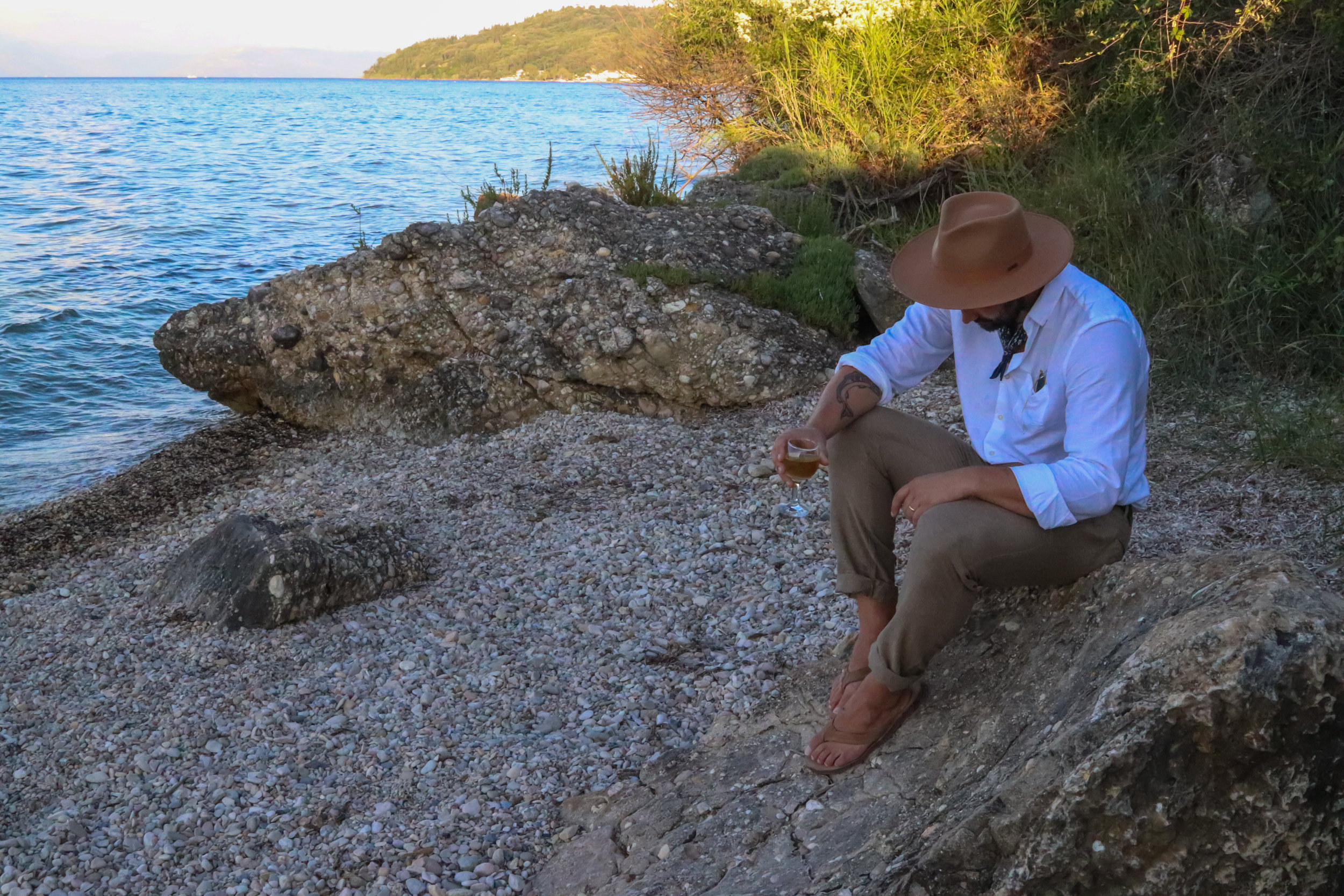There’s a bullfrog that lives on the bottom step of our villa. He (we don’t know the gender, really, but it looks like a he) comes out of his little hole and sits perched on the step only at night, so far as we can tell. Garrett and I first saw him when we were walking home from a late dinner. We started to go up the stairs and Garrett noticed him as he noticed us. I swear he made eye contact with me and then very slowly turned around and very slowly walked, not hopped, back into his hole. We were enamored. We’ve been going back to look for him every night since.
“He has been there many years,” our Airbnb host said with a shudder. “Don’t touch…ah, allergies,” she says, mimicking poisonous bumps on her arms. Noted.
This is what our slice of Corfu is like; full of creatures. The cicadas chant like maracas all day and all night. We have to wear water shoes to avoid the sting of sea urchins if we swim right outside of our house. The water is so clear, luckily, that you can see and chart your course around them. Stray cats are everywhere. The other night, we encouraged a stray dog to follow us home so we could give him food and water. As we were coming up on the end of our stay, we only had rice cakes and feta cheese in tow; he gladly lapped up the water and scarfed down the cheese, but wouldn’t touch the rice cake. There are lots of lizards and ants. Fish that we’ve never seen before. Butterflies flit through the air and bees are a constant bother. I talk to bees, now. “Get away! This is not for you!” I yell when they come after my food. They’re always coming after my food. Hundreds of sparrows fly past our balcony every day, heading south in the mornings and back north in the evenings. This island is so alive, and I love it.
Garrett and I rented an Airbnb along the southeast coast of Corfu, between the towns Messonghi and Boukari. It’s a pretty remote area, which is what we were after. We have a balcony that overlooks the Ionian Sea and a tiny shower that is nearly impossible to wash off in without getting water everywhere. Our hosts Stelios and Christina, a retired doctor and his beautician wife, are kind and attentive. They live in the city, Corfu Town, or, as Christina endearingly calls it, “the town town” for the week and the winters, and spend their weekends and what they can of the summer here, at Villa Agrili.
Messonghi, the town to our north, is pretty touristy. Mostly British people, from what I can tell, though one British couple who now lives in Corfu told us, “you should see the place in August. It’s full of Italians. They’re always yelling.” We nodded, suppressed our laughter, and tried to not think of Messonghi with even more tourists in tow.
We have yet to come across any other Americans; the other tourists seem to be British, Italian, German, and Eastern European. Their presence is more saturated in bigger towns (like “the town town,” for example), but compared to other places we’ve been, the island doesn’t feel overrun. There are a lot of parts that still feel….real. And the locals that I have come across don’t seem to mind the summer rush. Just earlier today I overheard two Greek teenage boys capitalizing on tourism, teaching each other pickup lines in English as they splashed around at the beach:
“I would, very much, like to, spend more time, with you.”
“How long, is it, that you are staying, here.”
So the tourists are benefiting some people, at least.
Garrett and I walked down to a jetty one night so he could try casting his new hand reel. I had a glass of wine and my book, which, really, you can give me anywhere and I’ll be content. But this moment…it was pure happiness. The sun had already dropped behind the mountains and the sky was a light purple with sparks of gold and pink where the day’s clouds had been. We noticed another fisherman sitting on the beach about 100 yards away and waved. He waved back, and then with both arms gestured out to the ocean, then up to the sky. We nodded to him, gave a thumbs up. No words were exchanged, but a conversation was had. “Look how beautiful tonight is,” he said. “I know,” we replied.
All of the Greek people that we have encountered have been lovely and kind and vivacious. They live with great gusto. Their hospitality is unparalleled, in part because I think they are genuinely happy to show off their beautiful country, but also because they might need to. The tourist boom in the summer drives the bulk of the islands’ income for the rest of the year. From what we’ve heard, Corfu becomes a ghost town in the winter.
Garrett and I have driven throughout the island: to the northwest, the southern tip, the southwest. We’ve hiked down to Porto Timoni Beach—two beaches, actually, separated by a mountain range—from the small, old town of Afionas, and walked through the 18th-century Monastery of Paleokastristsa, perched on top of a hill overlooking hundreds of beach-going tourists. We watched fishermen bring in their nets at the end of the day in a tiny, but busy, fishing village. We drove down, and got stuck on, a set of stairs on our way to the Governor’s Olive Mill, until Garrett lifted the car off of the steps as I gunned it in reverse. What seemed to be the whole village, of course, came out to watch. We hiked 3 kilometers uphill in the sweltering afternoon heat to the 13th-century village of Chlomos, one of the oldest and most picturesque in Corfu. With the exception of one old store selling cold drinks and Balis Taverna overlooking the hillside, the town felt deserted. At one point, we came across a tortoise walking down the street. We had, and still have, so many questions about where this tortoise came from and where he was going.
Garrett woke up at 5:30 one morning to help Stelios bring in his fishing nets. “Small fish, small fish, small fish,” Stelios said, gesturing toward the water as he rowed his boat by. Garrett pointed out the pink and gold sunrise. “Pink sky in the morning, sailors take warning,” he said. “Yes,” Stelios nodded, “Albania.” There’s a little bit of a language barrier between us and Stelios, but that just makes our connection feel better, stronger.
Really, all of the locals have been easy to connect with. If you frequent a place twice, they remember you from the first time. They’ll shake your hand, give you a free pour of ouzo, take you to the best seat in the restaurant. And it’s just so…unpretentious here. When we came upon a row of blue beach chairs next to a taverna, we asked the waitress if they were for the restaurant only. “No,” she said, “we do own the chairs, but you can use. If you want drink from restaurant, fine, if not, fine. They are there for you.” Something like this would never happen back home.
That’s been a common theme for us while being here: this would never happen back home. And that is why you travel, is it not? To experience things beyond what you know, to connect with people, in spite of—or because of—the language barrier. To see a tortoise walking down the street of an isolated mountain village. To hear the altered voices of truck drivers calling, “fresh fruit, apricots, mangos, bananas, delicious,” over the megaphone as they go by. To eat whole grilled fish caught fresh from the sea. To feel the sense of a place, no matter where it is in the world.
We’ve enjoyed our time in Corfu immensely, and do hope to return one day. There is much, much more of the island to explore! But now we must continue on: first to Athens and then to Santorini. This island was the perfect start to our adventures abroad and we’re so excited for what’s to come.
If you’re interested in in visiting Corfu, let me know if I can answer any questions for you. I have travel tips for the island and have linked to our Airbnb, some of the experiences we’ve had, and restaurants we’ve eaten at—all of which I recommend!
Airbnb:
Restaurants:
Boukari Beach Taverna—situated right along the waterfront in the quiet town of Boukari, this is one of the most picturesque places you can enjoy a meal. Spiros, the owner, is welcoming and attentive.
Balis Taverna—perched alongside the mountainside in the town of Chlomos, you get views of the eastern side of the island from the northern mountains to the Ionian Sea. It’s gorgeous!
George & Elena’s Taverna—the common theme of this restaurant is, George will give you a night you’ll never forget. He sits down with you, connects you with other patrons (Garrett and I chatted with an Irish couple for almost two hours after George sat us at their table), and gives you way too much free alcohol.
Kaiser Bridge Restaurant—this was the best meal we had in Corfu; it was next level. And, you’re sitting on a dock that stretches over the water. It’s beautiful!
Taverna Gialos—I can’t find an online listing for this one, and maybe that’s a good thing. This taverna is in an old house surrounded by lush gardens and big, pink bougainvillea trees. It’s one of the prettiest places I’ve ever been!
Experiences:
Paleokastritsa Monastery—this Greek Orthadox monastery has beautiful old architecture, is full of greenery and napping cats, and has spectacular views.
Hike to Porto Timoni Beach—you’ll be rewarded at the end of this 45-minute hike down the side of a mountain with not one but two beaches. It’s the prettiest place I’ve ever swam!
Walk through Chlomos—this 13th-century mountain village is magical. And quiet. You can hike 3km up a paved road to reach this village, or drive around the switchbacks. We did both!
Issos Beach—was the only sandy beach we came across in Corfu. We rented a Top Cat catamaran one afternoon from VDWS; they also do a lot of kite surfing.
Visit the Governor’s Olive Mill—we did a learning and tasting experience through Airbnb, and it was great! Good to learn about the history and recent success of Corfoit olive oil. This is a family-run olive mill and they’re all really passionate about what they’re doing.
Travel Tips:
Most of the locals speak English. I noticed it’s the common language between them and most other foreign-speaking tourists (i.e. French, Italian, German).
Definitely rent a car! The island is big and a lot of the hikes, beaches, and cultural sites are spread out.
Carry cash, it’s preferred.
I recommend water shoes! Most of the beaches are rocky, and there are sea urchins.
We stayed along the southeast end of the island and enjoyed our easy access to the water and quiet pace of life immensely. However, most of the sites and experiences that I wanted to do were in the north, so if you’re looking for easy access to more things, I’d recommend staying near Corfu Town, but not in Corfu Town.

















